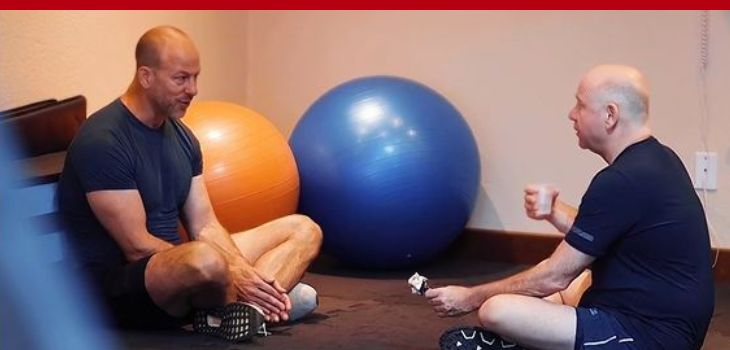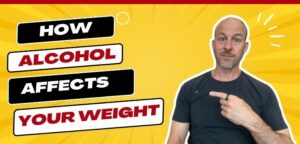by Ted Ryce
Ted Talk 201: The Untold Secret To Superhuman Performance
by Ted Ryce
by Ted Ryce
Ted Talk 201: The Untold Secret To Superhuman Performance
Ted Talk 201: The Untold Secret To Superhuman Performance
more
by Ted Ryce
Ted Talk 201: The Untold Secret To Superhuman Performance
We all want to be successful and have great connections with the people we care about. In other words, we all want to perform our best not only in our workplace but also in our relationships.
The question is: How can we perform like a superhuman? What is the secret? How can we get these superpowers?
For most of us, there seem to be so many obstacles in our way to success. We feel that we need to have superpowers to be able to get there. But is that necessary?
In this new Ted Talk episode, Ted Ryce will reveal powerful lessons from his own experience working with the highest-performing people on this planet. He will also talk about the importance of health in high performance, managing stress to perform better, and much more. Listen now!
You’ll learn:
- The most important lesson about high performance
- Ted’s life experience and how he became a high performer despite adversities
- How to be a high performer at all levels
- The importance of health in high performance
- Stress: How to manage and reduce stress
- The brain’s two ways of operating: focus mode and diffuse mode
- Why prioritizing is the key to success
- And much more…
Related Episodes:
Links Mentioned:
Sign up for my Unstoppable After 40 Newsletter
Watch My FREE Body Breakthrough Masterclass
Want some help building your best body ever?
Here are 3 ways I can assist whenever you’re ready.
1) Sign up for my Unstoppable After 40 Newsletter and get an email every Friday with tips and strategies on how to transform your body and reclaim your health in record time.
2) Want to learn the simple 5-step process my high achieving clients over 40 are using to skyrocket their energy and build younger, leaner bodies while enjoying life?
Watch my brand new Unstoppable After 40 Masterclass.
3) Work with my team and me directly to reclaim your health, lose fat, and get into the best shape of your life in 2023.
Marvel at the testimonials here first, then schedule your call.
Podcast Transcription: The Untold Secret To Superhuman Performance
Ted Ryce: I’m obsessed with human performance. I don’t know about you, but I want to learn how to do better, perform better, be better. And probably most importantly, I want to feel better. I want to feel my best. Yes, life has its ups and downs, but I want to feel my best for the greatest percentage of the time that I can. No, and I don’t mean avoiding anything that makes me feel uncomfortable; sometimes feeling our best means going after discomfort.
But one of the most important lessons that I’ve learned about performing at a high level is that if you want to perform like you’re superhuman, you have to realize that first, you are only human. If you get... well, I’m recording on a Mac right now. It comes with a manual of sorts, not a literal manual, it’s all online, but there’s a bunch of information about how to figure out how this MAC works or to troubleshoot a problem.
If you buy a car, it comes with a manual. So many things, they come with manuals, they come with instructions, so it’s easy to figure out. But our instruction manual, what we learn about how to live our lives starts with our parents.
And I don’t know how you grow up, but what your parents were like, and I love my parents. But they were not good, you know what I mean? There were great attorneys, they made money, they provided us with a lot of things, but as parents, didn’t really set me up for success in the world.
My stepmom spent a lot of time bothering me and my siblings over dinner, saying, “Hey, if you want to eat at nice restaurants, you’ve got to get good grades in school.” Well guess what? I am a college dropout, barely made it through high school and ended up dropping out of college twice—of course, good reasons for that. You know them if you’ve been listening to this podcast long enough. But now I’m more successful than either of them.
In terms of money, my dad made more money. But I’ll surpass him financially – not that that’s a thing, but I’m just using it to kind of compare. So that’s where we get our programming from, our instructions from, our parents tell us, “Don’t do this. Don’t do that. Do this, do that.” And most of us, we hopefully got adequate, but most of us got less than adequate parenting.
And this is all around. I don’t know, if you grew up...Some of the high performers, I know they come from a background of poverty and not a lot of education. And then they’re successful. And then other people, they come from a lot of privilege, right? And me, I’m kind of from an upper middle class background, both my parents were attorneys, my dad and my stepmom. My mother was a schoolteacher, but that’s a whole nother story.
So I come from, you know, certainly privilege to an extent, especially with in terms of education. I was spelling antidisestablishmentarianism when I was nine or 10 years old. And that was the longest word in the dictionary at the time. I'm sure there's something longer and more complicated now.
But the point is this, we are all trying to figure out, how do we get through life and perform at a high level and perform and feel our best. Wouldn’t you say that is the goal here? I mean, even with exercise and losing body fat and sleep optimization, isn’t it really about that? How do we perform better? How do we feel our best? Not just performing better in our work, but performing better in our relationships, especially in our relationships, I mean, what is life about, if not our connections with other human beings, with our family, with our friends?
And again, I want to return to this idea that if you want to perform like a superhuman, you have to realize that you're first only human. And what does that even mean? Well, it means that there are limitations on your body, you need to do things...there’s certain things that you need to do.
Just like when I was in my early 20s, I bought my first car. What was it? A Mazda RX3, or something like that. It was a hatchback, I bought it for like $2,200. So excited, it was a stick shift. Stick shifts were manual transmission, it was less expensive. So I was like, I’m going to learn how to drive a stick because I was broke, right? And I was personal training, so it was a fun car.
One of the things that you need to do for a car is that you need to change the oil. And I’ve shared this story before. And forgive me if this is like the third or fourth time that you’re hearing it, but you’re supposed to change the oil, “Oh, but I don’t have time to change the oil.” Yeah, there are consequences for that.
And that’s what happened to me, I ended up losing my car because I was too busy to get the oil changed. And the engine literally blew up, the car was not salvageable, because I had the belief that I didn’t have the time, I was too busy, I needed to either... And the truth was, I was so stressed. I was either working or I was just laying around trying to recover from the stress that I was under.
And so I didn’t have enough time, I felt, to do the things that I needed to do, like change the oil on my freaking car. And so what happened, I lost the car, the engine blew up, they towed it away, and never to be seen again. It was done. And because I wouldn’t pay attention to the warning signs, because I did get them, I felt, “No, it’s too much of an inconvenience. I don’t have time, I don’t have the energy to go get the oil changed.”
And because of that story, because of that belief, I ended up getting even more stress because now I didn’t have a car, and how do I make money while I go to clients and work with them? So what am I going to do? And Uber wasn’t around then. We’re talking like 22 years ago, right? 21 years, 22 years ago. So no Uber, taxis, hmm-mm.
So luckily, one of my clients let me use his scooter, drove that around, nearly got killed a couple times. Because hey, I don’t know if you’ve ever been in Miami and driven in the traffic there, but it’s not a place where you want to be on a scooter. Someone nearly ran me off the road, then they got mad at me.
And it was totally their fault, 100%, they literally shifted from one lane to the other, no turn signal, no nothing, no anything, they just were really sloppy driving. And it nearly either severely injured me or killed me, because I wouldn’t change the oil in my car.
And the point I’m making is this, if it’s not already immediately obvious, a lot of us, we say we don’t have the time, we don’t have the time to exercise, we don’t have the time to figure out how to lose fat, we don’t have the time to take a break from our stress. And so what happens, things build up. In this case, the oil in my engine, I guess, or actually it didn’t build up, it started to get less and less. And then the stress on the engine got too much and then boom. The engine, not exploded, but just broke down, it was done.
And we do this to ourselves, we do this to ourselves, we get to the point where we’re forced to take a break, all because our beliefs about how – we’re operating on the model of the world based on beliefs that we have, that are largely bullshit, right? “I don’t have time to exercise, I don’t have time to do this, I don’t have time." And then all of a sudden, you’ve got all the time in the world because all the things that you said that were so important, they just get on hold because you end up in the hospital with your first heart attack. Or you’ve got to get surgery to remove a toe because your diabetes is out of control.
Or like one my clients, and again, I have this story I’ve told many times and I’ll continue to tell it because it’s something that I just remember so strongly. I have a client, dude showed up, he was like, “I’ve got to leave early. I’m so stressed out!” He didn’t say he was stressed. But the stress was in his voice, “I’ve got to get out of here. I can’t finish this session, I’ve got to get out of here.”
Why? Because he had to go to work. He was an attorney, very successful, living in a multimillion dollar house in the Venetian Isles, if you know where that is in Miami Beach, nice area, not the top-top area, but pretty nice. It’s not Star Island or Fisher Island, but a pretty nice area. And the dude came to have stage four esophageal cancer.
I’m assuming he also—we didn’t talk about this, but I’m assuming he also didn’t have time to go to the doctor to get things checked, because they could have caught it long before it was stage four. I mean, the guy’s breath was so bad, like so bad. And I just figured, man, this guy’s got some stuff. I mean, I’m kind of, you know, I don’t know, I’ve got a strong stomach when it comes to those things. But I didn’t know him well enough, but it smelled like rotting.
And it wasn’t just bad morning breath, it was stage four esophageal cancer. The dude’s dead now. And that was his engine blowing up, simply because he didn’t make time. And I want to tell you this part because I don’t know if I’ve ever shared it about this story, but his wife was already annoyed with him for a long time. They still lived together. I don’t think they were divorced but it was kind of heading that way. She did not have a lot of compassion for him.
And I don’t know the whole story so I don’t want to say it’s all his fault because in relationships, there’s always two parts, right? There’s always two parts. But as I’m saying this, do you see any of yourself there? I mean, I do, unfortunately.
And again, bringing it back to this, we’ve got to know our limits. And a lot of our limits has to do with balancing the stress in our lives.
And I want to tell you how this works out. So I have been feeling stressed here in Florianopolis. I’ve kind of maxed out my time in Brazil. I’m really over… I speak Portuguese decently well. I won’t bother you speaking Portuguese again. I don’t know if you enjoy that. Or if it’s like, oh, God, he’s trying to show off his Portuguese. But I’m just kind of over it. It’s run its course. I need to go back home. I need to be around friends. I miss my friends.
I’ve had some calls with them. I just have a level of stress that I can’t shake with any of the things that I’m doing. But since I can’t immediately go—well, I could but I can be here for another four weeks and it’s not going to kill me, literally. I needed to find some things to do until my lease is up.
And one of the things that I’ve done is I went kite surfing, I started taking up kite surfing, never did it, never done it before. As you probably know from listening, you know I’ve jumped out of planes, I’ve gone cavern diving, I have done bull shark diving, scuba diving, got certified in Thailand in Phuket. I’ve done a lot. I do, and have done a lot of things.
And I’m totally new to kite surfing. I just took the day off yesterday and just went, and my whole day was shot afterward, I was so beat up by the water. Oh, my gosh, let me tell you, I had no idea what I was getting into with kite surfing. I thought it was just like oh, yeah, it’s kind of a cool thing. You just get on in and you get on the board and then the kite drags you around. It’s like being on a skateboard but you’re on the water and the kite drags you.
Or it’s kind of like surfing, which I’ve never done by the way. I’m from Miami not LA, where there’s no waves in Miami, okay? It’s just a nice relaxing beach. There’s only waves when there’s a hurricane. And I had no idea what I was getting into, let me tell you, kite surfing is a bit intense, when the wind picks up— and I had a bigger kite, this my second lesson, I had a bigger kite, and I got slammed yesterday.
If you lose control over the kite, the kite drags you –it is not forgiving. Oh, my gosh! I thought it was going to be way more sore today, but there were a few times oh, I got...I’d like to think I’m a humble person. Hopefully, I come across as that way. If you ever have a conversation with me, nobody’s ever come away and said, “Oh man, that guy’s a cocky douchebag,” right?
Well, hopefully not too many at least, right? Because this is very one sided. Sometimes I may come across that way but I listen to people, I share my shortcomings and believe me, I have many of them. But I did not go into kite surfing as a cocky guy. I really came in respecting the situation. But man, I got my ass kicked anyway, you know what I mean? I wasn’t in there like, “Yeah, I’m a weightlifting guy and I lift weights, I do Jiu-Jitsu, I’ll choke the ocean out.”
I didn’t come, you know, I didn’t do that. I showed up with respect, man, I still got my ass kicked. Oh, and let me tell you, in Jiu-Jitsu, there’s a relationship with the instructor and with other students, so you can say, “Hey, man, take it easy on me. I’ve got injuries.” And people are cool about that. But the ocean, the wind, it’s not forgiving. There’s no conversation with nature. It’s just like, “You are nothing to me,’ and it’s slam me over and over and over.
Anyway, the point is, in spite of this ass kicking that I received yesterday, it was kind of what I needed. I was operating too much from a place where I was just not performing well with some of the duties that I had. Now, I always show up for my coaching clients, I love coaching my clients. But when it comes to growing the business, that’s more of a, you know, I’m a coach. And I’ve had to put on the hat of...
The coach hat comes so easy to me, and I enjoy it. I love the conversations with my clients. I love how we strategically come up with... I mean, we’re like a Navy SEAL team, right, and we have each other’s back and we come up with a way to achieve the mission. We come up with a strategy, something doesn’t work, we re-evaluate, and then, you know, and that stuff, it comes so easy to me.
But growing the business, I’m not great at it. And figuring out how to lead this business along with my business partner, Gisele, leading mine because I’m like the guy who I decide the content here. I decide who gets interviewed here, I decide so many things. And it doesn’t come easy, it’s something that I’ve been getting better and better at. But I needed a break.
I had hit a wall and I needed to completely get out of that mindset. I needed to focus on something completely different. And now’s a good time to change gears a little bit and talk about why this is important. Our brains are complex. And I don’t want to come across like I’m some person with a PhD in neuroscience because I’m not.
But I’ll tell you one thing I’ve learned, is that our brain has two ways of operating. We have focus mode and we have diffuse mode, or I like to call it flow mode, focus mode and flow mode. So focus mode, you’re probably really familiar with that. I’m in focus mode right now, I am here recording this episode, I’m focused on everything that’s related to what I’m doing right now.
So I’m paying attention to how I’m speaking into the mic. I’m paying attention to my levels here so that I don’t give you crappy audio quality. I’m focusing on my delivery of the words, I say the concepts I share, the stories I tell, that’s focus mode. And for you, whatever focus mode is for you, right. You know, really focusing on something, but focus mode comes with stress.
For example, you can’t sit there for hours and hours and hours and hours and hours, focused on work and not pay a price for that. You can probably do it. And my business partner, Gisele, she’s great at this, she can sit there and drive and push herself to sit there and focus and sometimes she gets in such a focus state, she doesn’t want to stop working.
That’s probably what you relate to more than me. That makes me cringe thinking about that. I need to get up and move. I’ve got, I don’t know, ADHD, I have no idea but I’ve got to get up and move, but her and people like her.... And many of my clients, by the way, are like this as well. Once you sit there and get to work, you can’t stop. And you think it’s good because you’re like, “Oh, look at all the work that I’ve done.”
But yet your waistline is expanding, the chair, the amount of square surface area that your ass is covering is starting to grow on your seat. The amount of sleep that you’re starting to get or that feeling of good, you’re just kind of edgy. You’ve just got this constant sort of edge going on. We need to balance things out. And this comes back to the initial concept I shared today, if you want to perform like you’re superhuman, you’ve got to realize that you’re only human.
And so often, again, it returned to this idea to how we operate is on—we’re not operating on good data. Which is funny because most of my clients, they’re data-driven people. But we don’t operate on good data. For example, we know you operate in two modes, focus mode, diffuse mode. We need to focus but then we need to come away from the focus and we know this helps learning, this helps growth, this helps coming back and thinking about things differently.
It helps connecting dots in a way that you can’t do when you’re so focused, that’s stress, that focused mode is stress. And we need to balance the two. And it’s hard to do. We’ve got to read the signs, we’ve got to be data-driven. What are the signs? Well, if you’re having trouble sleeping, if you’re getting a little bit too irritable, if you track biomarkers, and you see your heart rate is a bit elevated, or your HRV is a bit lower than usual, time to do something about it, time to do something about it.
And let me ask you this question now, since we’ve been talking for a little while here, what are the symptoms that you’re noticing? How intense are they? Are you feeling and performing your best? Or are you kind of losing your edge, but still pushing yourself to go because you’re operating on this bullshit idea that, oh, I need to push myself, I need to finish this, so I need to push myself.
And really, who sets the deadline? You might set the deadline. A lot of my clients, they’re entrepreneurs, they set their deadlines. I’ll tell you one thing; I had a conversation, not actually a conversation, a business call with my business partner today. And we’re both stressed out, partly because they are waiting for me to finish some articles and episodes.
And for me, it takes time because I have a standard I won’t put out bullshit, I will only put out the best information. I believe it’s not competitive to put out crap information. And it takes time to do that, but they need it faster. So what we did, we figured out a solution to the problem. We’re going to be changing things to allow us to work on the most important things, the most important things our clients first.
So priorities are really important as well. We’ve got to prioritize our clients, our clients pay the bills, make the whole thing happen, makes Legendary Life happen, the number one things that we prioritize. Actually, is the most fun for me too. Helping people create breakthroughs. But the podcast needs to be considered as well. Most of our clients come from the podcast. We get great clients.
So we want to keep up with the same quality of information because we attract the right people. But at the same time, we need to figure out, I mean, this is the whole thing, we need to figure out how do we move forward. So what we’re doing, by the way, we’re going to take some time off of the Monday episodes. That’s kind of a long way of saying, “Hey, we’re going to take some time off from Monday episodes.”
Most of my clients say they listen to the Real Talk Fridays, anyway. I’ve had so many clients tell me, “Yeah, sometimes I listen to your interviews, but I always listen to your Real Talk Fridays.” And I really appreciate that feedback, and we act on it. So we’re going to be taking a break while we interview some more people, we’re going to launch a bunch of interviews, but we’re taking the time that we need, we’re restructuring our business.
Again, you can’t do everything and you’ve got to pay attention to the warning signs. That check engine light was on in my Mazda RX 3, I think it was—and I can’t remember the model the car, I’m not really a car guy you know, I like nice cars, but that engine light was on and I just fucking ignored it. And I paid the price literally and metaphorically. I paid the price. Got a great lesson, though. You think I ever missed an oil change again?
But the problem is, once you get a diabetes diagnosis or your first heart attack, that’s hard to come back from, it’s hard to come back from. It’s not something you want. No, no, no, we’re all going to get old, we’re all going to get sick, we’re all going to die. That’s part of the contract. You know, I think life is a beautiful gift. And that’s part of the contract. I’d rather not die, personally. But I’d rather not get old either, but it’s part of the contract, right? It is what it is.
It’s like, hey, you can have this amazing experience called life, but there’s an end date to it, right? So we’re all going to get there anyway. But why behave in a way that sets you up for other problems? Cars are going to wear out, you’re going to have to replace parts and do things, but why not take care of the car and do the things that you know that you need to do, especially with those engine lights on?
Do you have a check engine light on, on your vehicle, on your body? What are the check engine lights? Do you have high blood pressure? Are you overweight or obese? Are you having sleep issues? Are you feeling like your productivity at work is starting to diminish? Are you experiencing anything else? Are you having problems with your kids or your partner and they weren’t there before?
Especially with kids, I can only imagine, kids change. Oh, my gosh, they turn into teenagers, I was a terrible teenager. So, I shouldn’t say a terrible teenager, I required more care than my parents gave. And I’ve been through some early life adversities, abuse from my biological mother and her mental illness that made me require more. It’s not fair for my parents now to do that, but it just is what it is.
Again, there’s a lot of things we don’t get to decide, but we’ve got to manage. I know some parents that have special needs children. I had a client with a special needs child, she still crushed the program but it was an additional challenge for her. I had a couple of clients with special needs children. Shout out to you if you’re listening, Liz and Bassy.
So what are your check engine lights? What do you need to do to put yourself back into balance? How do you need to care for yourself so that you can turn that light off, so that you can do what you need to do? Or take care of what you need to take care of so that you can start to feel and perform your best.
If you’re not feeling and performing your best, it doesn’t matter that you’re hitting the gym and eating all the right foods, you’ve got to look at the data. Well, my client Jeff, who is probably the most spectacular body transformation I’ve helped to facilitate, shout out to you if you’re listening, Jeff. Man, this guy, he just made...
Well, I totally lost my train of thought. There was a great point there, I promise, happens sometimes. I’m not 100% right now, so I guess that’s my point. I’ll shift gears and tell you that’s my point. I totally forgot what I was going to share about Jeff. But he’s the most spectacular body transformation. And totally forgot my point about what he was going to do or what he did. Ah, so that’s the situation, folks. That’s the situation.
Anyway, to wrap this up, I would ask you this. What is the big takeaway for you from this episode? Do you have a check engine light? Are you telling yourself a story about why you don’t need to check it, why you don’t need to take action because you’re too busy because oh, whatever.
Oh, yeah. I remember my point about Jeff. Thank God, the brain is not completely broken, all right? I got slammed into the water quite a few times yesterday. I was even wondering, do I have a concussion because of this? This is not good for my brain. It was hard.
So, what Jeff told me, again, this guy has the most impressive body transformation. Now I’ve got a lot of impressive transformations. There’s Kevin, but Kevin was already almost ripped and then we got him ripped. So, what Jeff told me, he’s like, “One of the things that you helped me with Ted, you helped me stay focused on results, you helped me be results oriented.”
And if there’s something I can help you with, it’s that, you’ve got to be honest. And what being results-oriented is really about? It’s being honest. And a lot of us, we’re not honest. Sometimes it’s because we’re bullshitting ourselves. And sometimes it’s because we just haven’t taken the time to honestly assess our situation, so we’re just not aware. We’re not paying attention. We’re so used to ignoring. High performers in particular, are so used to ignoring the signals.
In fact, that’s, sometimes, “I’ve got to push through this.” And so you develop this habit, if you will, of ignoring things that you shouldn’t ignore. So are you telling yourself a story that’s not true, right? “Oh, I’m doing all the right things.” No, no, if you do the right things, you get results. Or are you not taking the time to do an assessment? Do you lack awareness? because that can be a problem, too. It’s not that you’re not being honest with yourself, it’s that you lack awareness.
And I’ll tell you, this one’s a tough one, because it’s hard to get awareness on your own. I got it doing Ayahuasca, I got it doing breathwork, I got to doing therapy, I got it doing meditation.
So what about today resonates with you in your particular situation? And then the thing that I would even end with here is what, after listening to my today’s spiel, today’s Real Talk Friday, what can you take action on?
Because another problem—so many problems, right?—is that, we learn something cool and we don’t take action. And that’s the modern world for you today, “Oh, I’m going to do this. That would be so cool. Oh, I just learned about this. This would be so cool.” But what do you take action on?
So don’t stop this and go to another podcast. Go take action on whatever it is that you learn from today, whatever insight came up for you. Maybe it’s not even related so much to the stories I told or even the examples I gave, or the concepts I’ve shared, but what came up for you today during today’s Real Talk Friday and what can you take action on right now? Go do that.
That’s what I want to leave you with. Hope you have an amazing weekend. Love you a lot. Speak to you on Monday!
Sign up to receive email updates
Enter your name and email address below and I'll send you periodic updates about the podcast.









